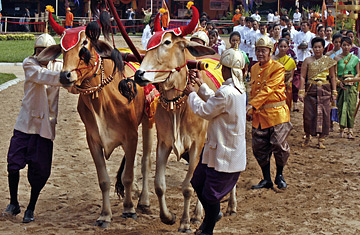
Cambodian royal oxen are paraded during the annual ploughing ceremony in Phnom Penh May, 2007.
This year, the oxen sniffed contemplatively at several of the trays. One then wandered away from the plentiful buffet. As the crowd held its collective breath, the other finally deigned to chew half the corn on offer before it, too, moseyed off. The outcome was grim: a drought, for sure, since no water was drunk, and a poor harvest to boot.
Cambodia's economy may have grown 10.4% last year, fueled by an influx of Chinese investment and strong clothing exports, but the country is still heavily dependent on agriculture — more than 80% of its 14 million citizens are farmers. Cambodia's population has doubled since 1975, and most of these extra mouths are in the countryside. In Phnom Penh, the tree-lined colonial avenues are being transformed by rapid construction that is uprooting fragrant frangipani trees in favor of glass-plated office buildings. The newfound wealth, though, hasn't extended much past city borders, and the disparity between rural residents and city folks is only growing wider.
The new economic reality made the results of the Royal Plowing Ceremony even more bitter for Cambodia's deeply superstitious farmers. A member of parliament watching the recalcitrant cows said he thought it was the most pathetic display of bovine appetite in more than a decade. (Making the sting more painful: royal cows at a similar ceremony in neighboring Thailand a few days later ate grass, corn and rice with gusto.)
Some Cambodians may be wondering whether an eighth tray should be added to the ceremony, this one holding a pool of oil. By 2010, a cluster of offshore fields should begin pumping oil and natural gas, radically changing the Cambodian economy. Optimistic estimates suggest that future oil revenue could dwarf the country's current GDP. But will any of this money trickle down to Cambodia's poor? Economists aren't sure, warning of a Nigerian-style oil curse that could simply make a privileged few very rich and leave the vast majority of people penniless.
Already, Cambodia suffers from rampant corruption, and there has been little transparency in the awarding of exploration contracts to foreign oil companies. Longtime Cambodian Prime Minister Hun Sen has dismissed concerns that oil will be anything other than a huge boon for his country. But for the poor farmers watching the oxen decline to feast at the Royal Plowing Ceremony, the potential of oil revenues must feel completely removed from their hand-to-mouth lives. What will they do if a drought does indeed strike this year, and their crops wilt in the tropical sun? If the sacred cows know the answer, they aren't talking.
